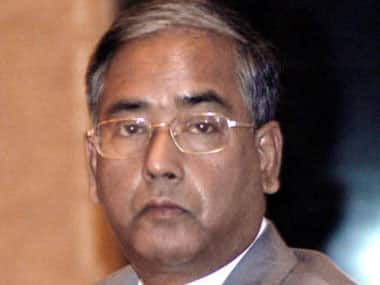Sebi chairman Upendra Kumar Sinha must count himself a lucky man. On Thursday (6 February), the finance ministry officially confirmed that Sinha’s three-year term, which ends on 17 February, will be extended by two more years - the normal tenure prescribed for such top regulatory posts. He will be the first Sebi chairman to get five years, but even at the end of his term he will be not equal the seven-year record tenure of DR Mehta, who served from 1995 and 2002.
He should consider himself lucky for three reasons.
[caption id=“attachment_75490” align=“alignleft” width=“380”]  Luck seems to be on Sebi Chairman UK Sinha’s side as he gets a two-year extension, When he completes his term, he would have been the regulator’s second longest serving chief.[/caption]
First, he got his job in February 2011 because P Chidambaram’s predecessor - or rather, his Officer on Special Duty, Omita Paul - did not take a shine to the independent-minded CB Bhave, the then incumbent. So when Bhave’s three-year tenure came up for renewal, he was given the heave-ho, even though he was earlier given to understand by the finance ministry that he would be given two more years. Bhave was a P Chidambaram appointee.
Not only that, two other officials associated with Bhave’s tenure - KM Abraham and MS Sahoo - were also sent packing without an extension. Abraham was the man who humbled the shadowy Sahara group and also blew the whistle on MCX and got the Anil Ambani and some of his top officials to pay a hefty fine of Rs 50 crore for unfair market dealings by two of his firms.
Bhave, Abraham and Sahoo ran foul of Omita - and were duly omitted from the regulator’s offices. Sinha was then a shoo-in for the job.
Second, the other luck factor related to a controversy that hit the fan after Sinha was ensconsced as Sebi chief. He got caught in the crossfire when Abraham wrote a letter to the Prime Minister alleging he was under pressure from Sinha, who himself was under pressure from Omita Paul and the FM’s office, to favour various corporate groups, including Sahara, Reliance and MCX.
This letter later formed the basis for a public interest litigation filed in the Supreme Court to oust Sinha from the Sebi seat. The Supreme Court threw this out. Another PIL challenged Sinha’s appointment on the ground that proper procedures were not followed in his appointment. But the Supreme Court nixed that PIL last November - just three months ago - and held that the appointment “was done fairly and in accordance with law.”
The third piece of luck relates to his current extension. As the man who replaced a Chidambaram-appointed nominee at Sebi, it is a safe bet that the current FM had no particular preference for his successor’s appointee. But this is election time - and major changes cannot be made without upsetting the apple-cart. The appointment of a new chairman by a government in exit mode would have been seen as controversial. So Sinha it is.
A similar piece of luck struck former Reserve Bank Governor D Subbarao in September 2011 when his three-year term ended. Pranab Mukherjee, who had no love lost for Subbarao - who was again a Chidambaram appointee, having served as his finance secretary in UPA-1 - was said to be toying with the idea of seeing him off after three years.
But fate lent a hand. The currency world went into a tailspin after the USA lost its Triple A rating from Standard & Poors, and as the currency markets gyrated, the mood in the PMO was that this was not the time to rock the boat. With former RBI stalwarts like Manmohan Singh and C Rangarajan in the PMO, Subbarao got enough backing to be given an extension for two years.
It is another matter that he fell out with the man who gave him the job - Chidambaram - when the latter returned to North Block after Pranab Mukherjee was dispatched to Rashtrapati Bhavan. Chidambaram didn’t like Subbarao’s reluctance to cut interest rates. But that is another story.
The moral is: luck matters when it comes to high-profile extensions.


)
)
)
)
)
)
)
)
)



